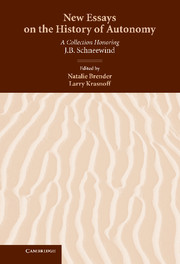Book contents
- Frontmatter
- Contents
- List of Contributors
- Acknowledgments
- Introduction
- PART ONE AUTONOMY IN CONTEXT
- 1 Justus Lipsius and the Revival of Stoicism in Late Sixteenth-Century Europe
- 2 Affective Perfectionism: Community with God without Common Measure
- 3 Autonomy and the Invention of Theodicy
- 4 Protestant Natural Law Theory: A General Interpretation
- 5 Autonomy in Modern Natural Law
- PART TWO AUTONOMY IN PRACTICE
4 - Protestant Natural Law Theory: A General Interpretation
from PART ONE - AUTONOMY IN CONTEXT
Published online by Cambridge University Press: 24 July 2009
- Frontmatter
- Contents
- List of Contributors
- Acknowledgments
- Introduction
- PART ONE AUTONOMY IN CONTEXT
- 1 Justus Lipsius and the Revival of Stoicism in Late Sixteenth-Century Europe
- 2 Affective Perfectionism: Community with God without Common Measure
- 3 Autonomy and the Invention of Theodicy
- 4 Protestant Natural Law Theory: A General Interpretation
- 5 Autonomy in Modern Natural Law
- PART TWO AUTONOMY IN PRACTICE
Summary
[Kant] believed that in the unique experience of the moral ought we are ‘given’ a ‘fact of reason’ that unquestionably shows us that we possess such [contracausal] freedom as members of a noumenal realm. Readers who hold, as I do, that our experience of the moral ought shows us no such thing will think of his version of autonomy as an invention rather than an explanation.
The first point to make when considering the significance of the Protestant natural law tradition is that it was not a tradition in the sense of a coherent body of doctrine unfolding during the early modern period. It is more adequately described as a genre in moral and political philosophy, characterized by the attempt to account for morals and politics by means of juridical concepts derived from Roman law and its medieval and early modern commentators. The central concepts were those of law, duty, obligation, right, contract, property and their many subdivisions. But this apparatus of juridical concepts was in the service of fundamentally different philosophies, and one may say that the tradition was as much characterized by disputes between opposing theoretical standpoints as by the coherence of its concepts. In other words, “the tradition” is an artifact that has to be analyzed before we can begin to assess its various components. A full account, however, would require much more than a conceptual analysis, for the different natural law theories were potent weapons in a variety of moral, theological and political battles, and they were, in large measure, shaped for such purposes.
- Type
- Chapter
- Information
- New Essays on the History of AutonomyA Collection Honoring J. B. Schneewind, pp. 92 - 109Publisher: Cambridge University PressPrint publication year: 2004
- 22
- Cited by



